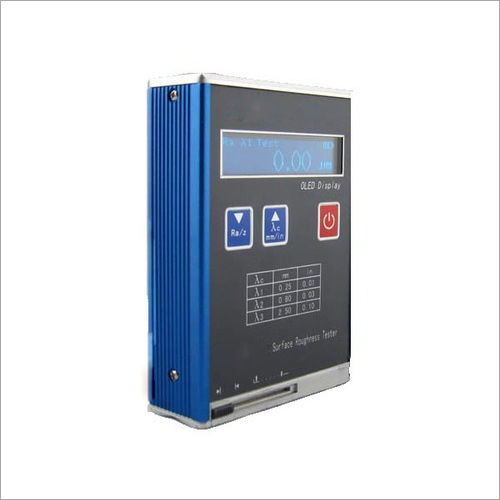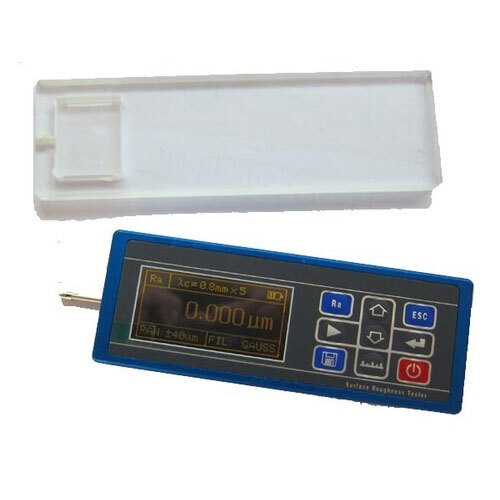Digital Surface Roughness Tester
Product Details:
- Product Type Surface Roughness Tester
- Voltage 110-220 Volt (v)
- Application Industrial
- Material Metal
- Color Black
- Weight 200 Grams (g)
- Click to View more
Digital Surface Roughness Tester Price And Quantity
- 10000 INR/Unit
- 1 Unit
Digital Surface Roughness Tester Product Specifications
- Industrial
- 110-220 Volt (v)
- Surface Roughness Tester
- Black
- Metal
- 200 Grams (g)
Digital Surface Roughness Tester Trade Information
- 100 Unit Per Week
- 1 Week
Product Description
The hardness of a material refers to its resistance to permanent surface deformation caused by the effect of a geometrically defined body. Besides, the surface of our Digital Surface Roughness Tester is mechanically equipped by the pressure of the hard substance, and the result is expressed as the hardness value. The tests are often used due to their usefulness and simplicity in situations when other tests are ineffective. In comparison to other mechanical tests, it impacts just a small portion of the metal's surface. All Digital Surface Roughness Testers need the test object to be brought to the tester, which is not always possible.
Product details of Digital Surface Roughness Tester:
- Model No: PRO-UR-SR-SR110
- Shelf Life: 12 Months
- Color: Blue,Black
- Voltage: 110-220 V
- Frequency: 50-60 Hz
- Stroke Length: 6 mm
- Sample Length: 0.25,0.80,2.50 mm
- SR110 Surface Roughness Gauge The performance advantage
- The roughness of metal and non-metallic surface
- Pocket-size & economically price
- Large measuring range suitable for most materials
- Features external calibration at keyboard
- Optimized electric circuit design with transducer structure-design, high integrates power, driver and display
- Select freely with RA, RZ, RQ, Rt parameters
- It could test ex-circle, flat surface, conical surface and also test groove with length and width larger than 80*30 mm
Main Function:
- Shape used to pull aluminium mold design, durable, anti-electromagnetic interference ability significantly, in line with the design of the new trend
- Using high-speed DSP processor for data processing and calculation, measurement and computation speed is greatly improved
- Liquid crystal display wide temperature using LED color display, popular high brightness, no visual angle, is suitable for various occasions
- The lithium ion rechargeable battery, can work for a long time, no memory effect, can while charging, charging time is short, long battery life
- Charging and communication using the common USB interface
- Using a dedicated charger or computer USB port for charging, convenient and quick
- Dot matrix liquid crystal display, interface prompt information rich
- Testing parameters(um) RA, RZ, RQ, RT
- Stroke length mm 6
- Sample length(mm) 0.25 ,0.80 ,2.50
- Evaluation length(mm) 1.25 ,4.0
- Measuring range(um RA, RQ: 0.05-10.0; RZ, RT 0.1 50
- Error 15%
- Variability 12% Transducer contacting pin round diameter and angle
- Contacting pin round diameter 10 pm1 pm
- Battery 3.7 V Li
- Size 106 mm 70 mm 24 mm
- Weight 200 g
Sensor needle static force and its rate of change
- Stylus static force 0.016 N
- Force measuring rate of change 800 N/m
Working conditions
- Temperature -20-40
- Relative humidity < 90%
- No shake and coercivity around
FAQs of Digital Surface Roughness Tester:
What is surface unpleasantness analyzer?
A harshness analyzer is utilized to rapidly and precisely decide the surface or surface unpleasantness of a material. An unpleasantness analyzer shows the deliberate harshness profundity (Rz) as well as the mean unpleasantness esteem (Ra) in micrometers or microns.
Which instrument is utilized to actually look at surface harshness?
Unpleasantness meters, likewise called surface harshness meters, are instruments that action the perfection (level of harshness) of the outer layer of an objective. The fundamental sorts of meters use either tests or lasers.
How would you gauge surface unpleasantness?
With a contact-type unpleasantness meter, surface harshness is estimated by following the test across the outer layer of the objective. Conversely, a laser-based non-contact unpleasantness meter emanates a laser pillar onto the objective and recognizes the mirrored light to gauge the harshness.
Reliable Industrial Surface Roughness Measurement
This digital tester delivers dependable surface roughness analysis for industrial settings. Its robust metal construction ensures longevity, while the user-friendly design aids technicians in capturing accurate readings across different machinery and products. Tailored for use in manufacturing, engineering, and quality control labs, the instrument streamlines inspection processes and supports rigorous industrial standards.
Flexible Voltage Compatibility
The Digital Surface Roughness Tester supports a voltage range of 110-220V, accommodating diverse power requirements found across Indian industrial facilities. This flexibility allows effortless integration into existing workplace setups, guaranteeing consistent performance without the need for additional conversion devices.
FAQs of Digital Surface Roughness Tester:
Q: How is the Digital Surface Roughness Tester used in industrial applications?
A: The tester is used to measure the surface roughness of machined parts and components. Operators run the devices probe over the target surface, and digital readings are displayed instantly, allowing for quality control and process validation in various industrial settings.Q: What are the main benefits of using a digital surface roughness tester over traditional methods?
A: Digital testers provide rapid, highly accurate measurements, minimize human error, and present data in an easily readable format. They enhance productivity, support consistent quality assurance, and reduce the time needed for inspections.Q: When should you utilize a surface roughness tester during manufacturing?
A: It is best to use the tester after surface machining or finishing processes to ensure the parts meet specified roughness standards before final assembly or shipment. Regular checks during production also help maintain consistent product quality.Q: Where can you purchase the Digital Surface Roughness Tester in India?
A: You can obtain this instrument from recognized exporters, manufacturers, service providers, suppliers, and traders specializing in industrial measurement devices across India.Q: What is the process of measuring surface roughness with this tester?
A: To measure, place the tester on the surface to be evaluated, guide the sensing probe along it, and the device will digitally compute and display the roughness value, usually indicated in Ra or Rz units.Q: How does the voltage range benefit users of this tester?
A: The 110-220V voltage compatibility means the tester can be used in a variety of Indian industrial environments without requiring additional power adapters or modifications, ensuring seamless operation.Q: What materials and industries are most suitable for this surface roughness tester?
A: Constructed from durable metal, the tester is ideal for metalworking, automotive, aerospace, and precision engineering industries where surface finish quality is vital.
Price:
- 50
- 100
- 200
- 250
- 500
- 1000+
 English
English Spanish
Spanish French
French German
German Italian
Italian Chinese (Simplified)
Chinese (Simplified) Japanese
Japanese Korean
Korean Arabic
Arabic Portuguese
Portuguese



 Call Me Free
Call Me Free
